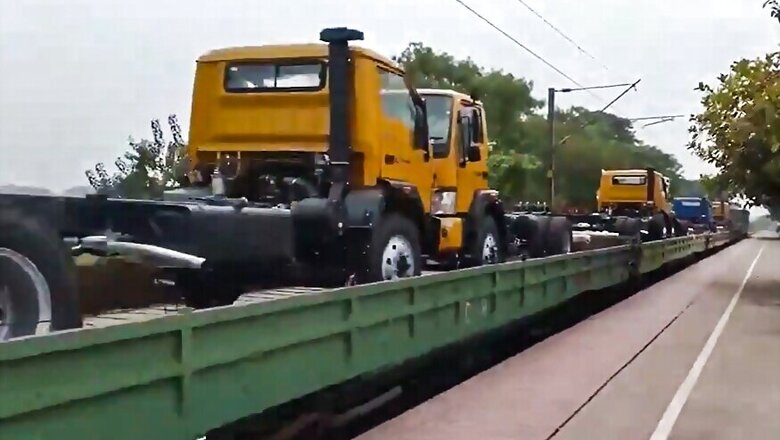
views
The Coronavirus lockdown has brought upon unprecedented times for the Indian automotive industry because of which, automakers are having to find new, cost-effective ways to get back to a sense of normalcy which has been lost since March 2020. One of the interesting scenarios that have come out during this search is the fact that Railways is becoming the next big thing in vehicle transport.
As automakers figure out newer ways that let them meet their targets in a more cost-friendly manner, the Railways come across as not only better value for money proposition to transport vehicles from the state having that automaker’s manufacturing plant, to their destination state for sale, but also a safer offering. This is because it means that in one go, you can transport a lot of vehicles without having to worry about things like road accidents, traffic jams or mechanical breakdowns of the trucks that are delivering the vehicles.
An example of just how big of a scale we are talking about can be seen from the video that was tweeted by Piyush Goyal, Minister of Railways and Commerce & Industry.
Trucks on Trains: Railways enhances automobile transport in India. pic.twitter.com/RUZjCHZxpW— Piyush Goyal (@PiyushGoyal) July 19, 2020
In order to understand how big of an impact Railways can have for an automaker, let’s take a look at the case of Maruti Suzuki.
Recently, India’s largest automaker Maruti Suzuki had announced that it has offset around 3,000 MT of CO2 emissions by transporting cars through railway. As part of this, the company transported over 6,70 lakh cars through the Indian Railways in the past six years, witnessing a CAGR of over 18%. The first dispatch by double-decker Flexi-deck rakes took place in March 2014.
In addition, over 100 million litres of precious fossil fuel was saved, as the Company could avoid over 1 lakh truck trips on the National Highways.
In FY 2019-20, over 1.78 lakh cars were dispatched by rail mode, a 15% increase over the previous year. This accounts for nearly 12% of the total sales of the Company in the year.
Explaining the importance of railways as one of the important modes of transport, Kenichi Ayukawa, Managing Director & CEO, Maruti Suzuki India had said, “Considering the increasing volumes, our team felt the need for large scale logistics flow. We realised, that not only for expansion but also for risk mitigation we have to look beyond road mode logistics.”
Maruti Suzuki is the first auto manufacturer in the country to obtain Automobile Freight Train Operator (AFTO) license. This allows private firms to fabricate and operate high speed, high capacity auto-wagon rakes on the Indian Railway’s network.
Also Watch:
At present, Maruti Suzuki utilises five loading terminals (Gurgaon, Farukhnagar, Kathuwas, Patli and Detroj) and 13 destination terminals (Bangalore, Nagpur, Mumbai, Guwahati, Mundra Port, Indore, Kolkata, Chennai, Hyderabad, Ahmedabad, NCR, Siliguri and Agartala). With the addition of Agartala, the reach of rail mode has now been extended to far North East. As per the company, it has helped to reduce the transportation time to these states by nearly half.













Comments
0 comment